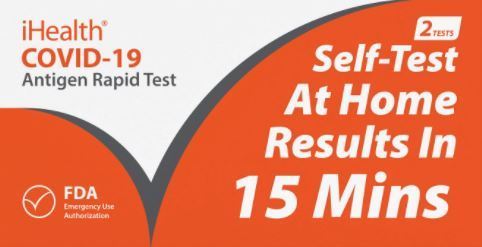The federal government has increased its distribution limit of free at-home rapid antigen COVID-19 tests. If you already placed two orders for free tests, you can now place a third order for eight more. In total, each residential address can receive a total of 16 free at-home tests. The tests can be ordered here, to be delivered to your home via the U.S. Postal Service.
Click here for more information on the federal government’s plans to make COVID-19 testing accessible to all.
 Update on the baby formula shortage
Update on the baby formula shortage
National baby formula maker Abbott Laboratories could restart production at its shuttered Michigan facility in a couple of weeks. If that happens, consumers could see store shelves fill up with formula in six to eight weeks. Meanwhile, the U.S. Food and Drug Administration is taking steps to increase the supply of baby formula in the United States.
In Oregon, members of the Women, Infants and Children (WIC) program can use their benefits to purchase other brands. Read on to learn about your options and how to spot potentially contaminated baby formula, as well as why health officials warn against feeding babies homemade formula or cow’s milk.
![]()
![]()
FDA authorizes COVID-19 booster doses for children ages 5 to 11
Today, May 17, the U.S. Food and Drug Administration (FDA) authorized Pfizer COVID-19 booster doses to be available to children ages 5 to 11 at least five months after receiving the last dose in their primary vaccine series.
“While it has largely been the case that COVID-19 tends to be less severe in children than adults, the Omicron wave has seen more kids getting sick with the disease and being hospitalized, and children may also experience longer term effects, even following initially mild disease,” said FDA Commissioner Robert M. Califf, M.D.
There are a few more steps before these pediatric booster doses may be available in Oregon.
The Centers for Disease Control and Prevention’s (CDC) Advisory Committee on Immunization Practices (ACIP) is expected to meet Thursday and make a recommendation. If the CDC recommends the boosters, the Western States Scientific Safety Review Workgroup (WSSRW) will meet at 5 p.m. Thursday. Oregon Health Authority (OHA) representatives will attend both meetings.
“If boosters are recommended for children in this age group, they will be available immediately, because the vaccine already exists, and supplies are plentiful,” said Dr. Paul Cieslak, medical director for communicable diseases and immunizations at OHA. “The most important thing for most children is to get the primary series of vaccines, because they can protect against severe disease if the child gets infected. Boosters are most likely to benefit vaccinated children who are still at risk for severe disease. Also, boosting may be a good idea in children who have close contact with adults at high risk.”
Consult your physician or a health care provider if you have questions. If you do not have a health care provider, call 211.
![]()
![]()
OHA experts answer your questions about vaccines
 |
![]()
Dr. Paul Cieslak, medical director for communicable diseases and immunizations at Oregon Health Authority, answered today’s questions. We’ll continue to answer your questions on COVID-19 topics in upcoming newsletters.
Q: I’m over 65 and eligible for the 2nd booster. I’ve held off because I’m going to Scotland in September, and I’m afraid the effectiveness will wear off by then and it will be too early for another booster. What should I do? – Claudia, Turner
A: “COVID-19 is circulating briskly in Oregon now, and if you have underlying conditions that put you at high risk, you should consider getting the booster now. Otherwise, you might wait until July or August.”
Q: My 16-year-old child had a Pfizer booster shot shortly after being unknowingly exposed to COVID. We found this out after the fact because my child tested positive for COVID two days after getting the booster shot. Since my child presumably already had COVID at the time the booster shot was administered, was that booster effective or should it be repeated? – Anonymous, Portland
A: “We have no reason to believe that having COVID-19 reduces the effectiveness of the booster shot; and indeed, the immunity generated by the infection is significant. You can consider your child ‘boosted.’”
Q: I received a J&J vaccine initially, which I followed up with a Moderna booster. I’m eligible for a second booster. Does the effectiveness of the Moderna booster wane as quickly as the Pfizer booster as described in the Israeli study mentioned in the New England Journal of Medicine? – S.C., Dillard
A: “We are not aware of a study that evaluated how quickly immunity from a first Moderna booster wanes. The Centers for Disease Control and Prevention published a study showing waning immunity after boosters in general, but it did not distinguish between Moderna and Pfizer. A study from Qatar showed better effectiveness after Moderna boosters than after Pfizer boosters; but it did not look at the rate at which immunity from either waned. The U.S. Food and Drug Administration (FDA) has authorized a second booster for certain groups four months after a first booster dose, whether it be Pfizer or Moderna.”
Q: Any update on COVID-19 vaccines for kids under age 5? – Nina, Portland
A: “We have seen no data from Pfizer on the efficacy of its three-dose series for children under age 5. On April 28, Moderna filed for FDA authorization for use of its vaccine in children under 6. In the data it submitted, Moderna stated that its two-dose series was 51% effective in preventing COVID-19 in children between 6 months and 2 years of age, and 37% effective in children between 2 years and 6 years of age.”
![]()
Readers share thoughts on wearing masks

![]()

 |
 |
 |
 |
 |
 |


